#'game mechanic' or 'narrative cop-out'
Text
cw: mention of suicide
not sure how many of you are into traditional horror games (or more specifically the indie horror game scene)
and while i don’t usually play these games myself i enjoy watching playthrus on youtube and one of the games that circulated pretty recently was MADiSON, as well as martha is dead, and less recently was the blair witch.
all 3 of these games have 2 things in common: they are “psychological horror” and they all have suicide endings.
i hated all of these games. i think if i had to choose, martha is dead is the one i hate the most. but i don’t want to talk about that specifically (we’d be here all day)
it’s very obvious that there’s a trend towards “psychological horror” or as they call it in film for some reason, “elevated horror” and i think it’s fair to say that that’s true for IF as well. i don’t think that’s a bad thing, i like psychological horror, i don’t really have a preference to be quite honest; what i dislike, though, is the demonization of mental illness.
it’s always been a problem in the horror genre, but now i think it’s shifted slightly in a less direct way. i started thinking about this because i was watching a review about the blair witch project game, and she opens up the video talking about the ending, as well as MADiSON’s.
she made some really interesting points that i think are worth repeating. i know up until recently i had a “sanity” mechanic in tnp - it served a purpose, and it still does, but it never really needed to be labelled that way.
the reviewer even makes a comment about how mental health has been reduced to a “bleak soft magic system” - a game mechanic, a setting for people to play around in, a setting where bad things can happen for no reason other than it’s dark and edgy and shocking.
her criticism essentially boiled down to: mental illness isn’t your playground to experiment in, to spitball ideas for your horror game, it isn’t a toy you can pick up and play with. it’s not a game mechanic, it’s something that real people live with every single day. and that really resonated with me and put into words what i couldn’t.
tnp revolves around the hunter and their mental health - it’s an important part of their character, and impacts the way they interact with their companions and the wider world of the game, as well as how they deal with the rot. and with it being fantasy, it definitely blurs the line - is it magic? is it their imagination? is it the rot/their illness? was the hunter the killer all along?
mental illness can be scary. but it’s also manageable. it is not Thee Horror at the end of this book. and i think that’s important to remember when writing some of these horror stories. what is the point of mentioning this here, in this specific story - is it just for shock? is it just to imply and emphasize some imagined horror about the mentally ill? is it just to slap “dark themes” in the description, to grab the attention of some edgy readers? or is it actually serving a purpose in the narrative, offering something of substance beyond “mental illness scary”? beyond “dark and edgy” just for the sake of it?
here is the original video. i haven’t finished it, but the opening 10 minutes is where she discusses the trend of “suicide endings.”
it definitely made me pause and think about how i’ve approached things in tnp, and definitely made me regret not changing the humanity mechanic sooner.
#sorry i Need to talk about this and it's specific to game design and writing so. here you go#also i hate the indie horror scene lately if it's not shitty psychological horror#it's awful fnaf/walten file ripoffs targeting children lol#and for the record i hate the term 'elevated horror'#anyways mental health is definitely a focus in tnp and i hope i can do it justice without reducing it to#'game mechanic' or 'narrative cop-out'#oh i also dont know anything abt this youtuber this just showed up in my recommended; but that discussion just really resonated w me#personal#cw suicide
112 notes
·
View notes
Text
I can't stop thinking about the narrative use of guns and violence in Disco Elysium, and how the lack of violence as a gameplay mechanic leads to a emotionally richer story and more fully realized world.
You go through a lot to get your gun back - on my playthrough it was the last thing I did before I confronted Ruby - and then there's only one point in the game where you can actually fire it. In my playthrough, the Necktie Molotov Cocktail missed and Harry never had the opportunity to fire his own gun at all - the only time it was used in the whole game was by Kim.
Other uses of guns include:
When you learn that Roy bought Harry's gun only because Harry was going around threatening to shoot himself with it.
Trying to shoot the body down; Kim doesn't make the shot, and when Harry tries, you fear he might shoot a passerby by accident (I was terrified he would accidentally shoot Kim or Cuno).
The discovery of the weapons cache, and bitter knowledge that with more caches all over Revachol, there's no way any can prevent widespread violence.
The Pigs threatening Harry and Kim with Harry's gun: it's tense, and terrifying, and incredibly sad, as your fear for your own wellbeing slowly shifts into a fear for hers.
Ruby threatening to kill herself; in my playthrough, I failed to talk her out of it, and I think it was the most horrifying moment of the game.
The Deserter spent decades spying on the world through his rifle scope, fantasizing about killing people from afar. When he actually pulled the trigger, it kicked off the series of events that led to open violence on the streets of Martinaise (and might still lead to more.)
Every time guns are used, either onscreen or off (and there are very, very few instances of gun use onscreen), it's shocking and brutal. Bringing a gun into any situation ratchets up the tension and scares everyone, including Kim and Harry, who have decades of experience as cops and have both killed people.
This isn't a game where violence is normalized. It especially isn't a game where deadly violence is normalized. It's such a contrast from games where combat is a part of gameplay, and the use of violence is ordered and expected and strategic. It's such a contrast from the game ZA/UM originally planned to make:
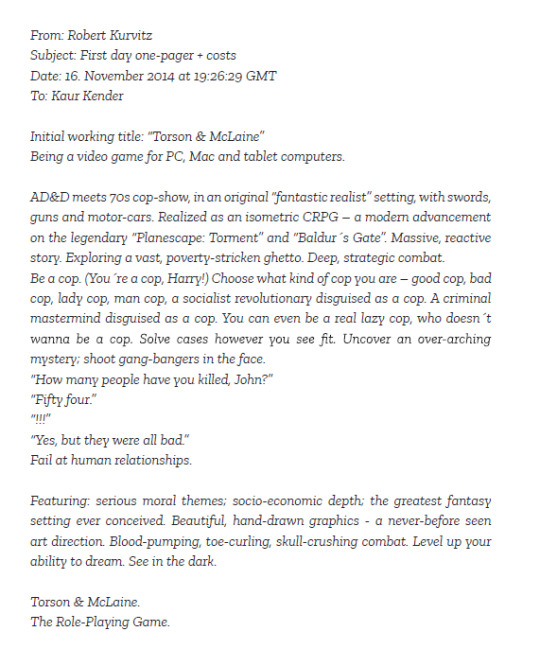

(images from the Disco Elysium Artbook)
And that's so interesting to me because it's incredibly effective, and it feels more real this way, but it's absolutely not what I would have expected from this genre of story in a setting like Martinaise. You're playing as a cop in a poor, war-scarred neighborhood where the biggest power is basically a mob boss. If I didn't know anything about DE and someone described it to me I would have expected something more like, well, Torson & McLaine: shoot-outs in the streets, life is cheap, you know. Combat is still the primary gameplay mechanic of many (most?) games out there, and by necessity that turns most of the people in any combat-based game into mindless mooks who are there to be slaughtered en masse.
But Disco Elysium doesn't do that. In DE, every single interactable character is a fully realized person. Most of them have surprisingly deep conversational trees, and those conversations change as you proceed through the game and have new experiences and learn new things. Even characters you can't talk to much feel like real people; you're just seeing the tip of the iceberg. No one is disposable cannon-fodder. And it makes the world feel so much more real than any other CRPG I've ever played, and when anyone actually gets killed or seriously wounded, it's a shock; it's awful. You grow to know and love this little district and the people in it. The looming spectre of violence in the streets of Martinaise as you race against the mercenaries to solve the case feels like a real threat.
It's just. Really good, y'know?
226 notes
·
View notes
Note
Do you have any videogames with strong narrative and story elements you'd be willing to recommend?
sure. i mostly care about games on the basis of their narrative and story, as far as i'm concerned the best gameplay is whatever complements that. here's my top ten:
pyre, by supergiant games

pyre's story is incredible. it's about people who've been exiled from society, and the things they build in exile, and whether society was really worth all that much in the end. it makes you make really genuinely difficult choices--i once deliberately threw a fight in this game because one of my party members asked me to--and it embraces failure as a mechanism by which the story can be advanced instead of ground to a halt.
disco elysium, by ZA/UM studios

if you've followed me for any period of time you've probably seen me talking about disco elysium. it's a masterful work of magical realism, it's melancholy and bleak and hopeful. it's about communism and cryptids. it's about all these things but it's nominally about being an amnesiac detective investigating a murder in a bleak post-soviet city that's been ransacked and occupied by international capital. and it's also very funny
heaven will be mine, by Worst Girls Games
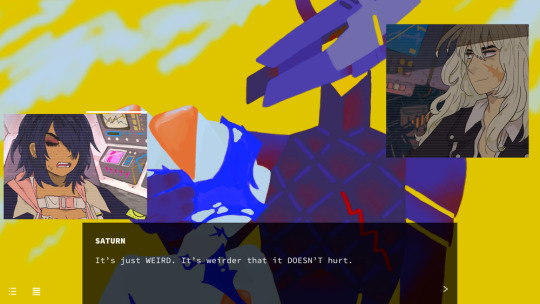
heaven will be mine is about gay sex. it’s about other things but mostly it’s about gay sex. it’s about transgender lesbian mecha pilots fighting and fucking each other in their big robots which are metaphors for body dysmorphia and self-image and violence and hopes about the future. it genuinely reckons with the sci-fi genre and what it represents. every ending is a good ending because the characters will not let even the worst disaster be a bad ending.
hypnospace outlaw, by Tendershoot

hypnospace outlaw makes you a forum mod on a simulated early-2000s internet platform that you can only access in your dreams. it’s less about a linear narrative and more about getting to learn about characters through the strange and oddly intimiate things they post on their webzones. if you’ve met people you care about through the internet it will resonate with you.
paradise killer, by Kaizen Game Works

paradise killer is a murder mystery with no ‘right’ or ‘wrong’ answer. don’t get me wrong, there’s an answer to the mystery--it’s possible to conclusively identify the murderer. but you can also walk into the trial the moment the game starts, accuse the obvious stitch-up suspect, present the circumstancial evidence you’ve been handed by shifty players, and get him sentenced. the game won’t stop you. imagine if instead of funelling you towards getting the ‘right’ answers in order to progress, ace attorney all hinged on what evidence you chose to present and how. the game won’t stop you from being wrong! figure out the truth yourself, or don’t bother--you’re an immortal blood cultist cop, you won’t be the one suffering the consequernces of your mistakes.
the beginner’s guide, by Davey Wreden

the beginner’s guide presses you up right against the wall by your lapels and demands: why are you playing this? how do you interact with art? what can you say about an artist from their work? is it right or fair to say anything at all? is the way you engage with the things you love healthy? it’s best enjoyed blind so i won’t say anything other than that--but it made me cry.
if not us, by ubq4
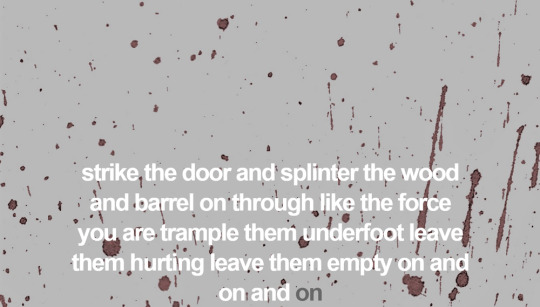
a tragedy that will pulverize you. interactive fiction about the aftermath of five doomed heroes failing to save the world. does really interesting things with IF gameplay to convey different emotions and perspectives. made me cry more or less the entire time i played it. beautiful prose delivered perfectly.
dujanah, by Jack King-Spooner
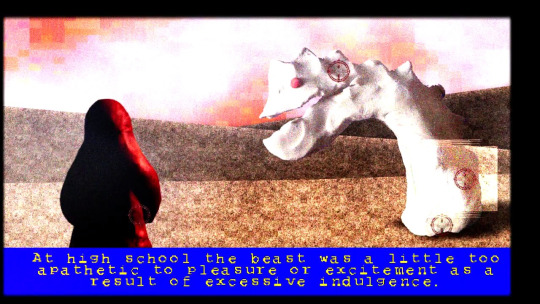
a surreal claymation genre-mashup story about grief and death. dujanah is looking for her dead husband and child in a world that’s sometimes whimsical and sometimes nightmarish. the shifting dreamlike atmosphere makes this game’s political points more pointedly and acutely than any amount of gritty realism could. there’s nothing else like it
cultist simulator, by Weather Factory

this isn’t a narrative linear game--it’s a roguelike card type thing, but it creates such a rich and textured world with an economy of writing that is absolutely fucking mindblowing. a few sentences at most are dedicated to any given topic, and put together they weave an incredible tapestry of the first interesting ‘cosmic horror’ setting to be invented for what feels like decades. (nb: the main writer of this game, alexis kennedy, stands accused of some pretty slimy shitty stuff--so be aware of that and look into it before playing it, probably)
suzerain, by Torpor Games
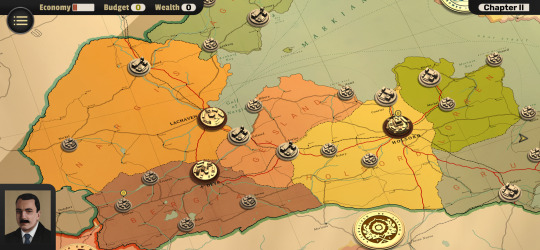
suzerain is a visual novel cleverly disguised as a strategy game. it’s not about moving armies around a board or building units or planning out cities--it’s about playing the character of anton rayne, newly elected president in a pseudo-Eastern European country caught between superpowers. the only good game about politics, you’re really forced to juggle multiple different allies and enemies at once, decide which political hills to die on, or risk being assassinated, couped, or invaded. if you like political intrigue and drama, this is where it’s at.
honorable mentions: Transistor (Supergiant Games) and Shadowrun Hong Kong (Harebrained Schemes)

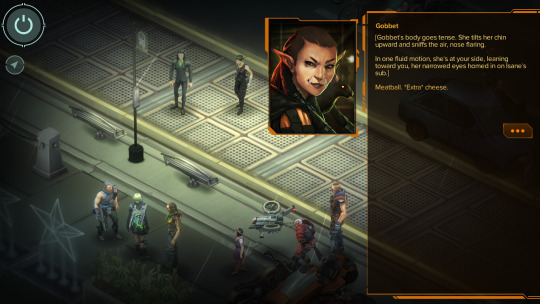
transistor is a game with fascinating themes and a flawless sense of tone. its world feels so vivid and unqiue, and the ideas it plays with are fascinating--but ultimately i feel like it’s more style than substance. that fucking style though, unimpeachable. shadowrun hong kong on the other hand has a fairly weak narrative but some incredibly well-drawn and interesting characters and the rare totally (for me at least, ymmv) succesful integration of a pre-established backstory with freeform character creation.
276 notes
·
View notes
Note
Do you have any tips on making enemy factions feel different to fight against, without spending too much designer and programmer time making full sets of different abilities for each faction? For context, I'm working on a cyberpunk brawler with 3 major enemy factions (corp, gang, cop).
Sure. The way to enforce the feeling that a faction is a real thing is that all units from that faction should feel like there's a common theme among them. I suggest that you establish a "faction ability" (or a pool of faction abilities) that all units from the same faction will share in addition to their "class" ability. This way you can create a handful of abilities that can be reused across many enemies and tie everything together at the same time.

Faction abilities should showcase what that faction "feels" like, both from a narrative sense and a gameplay sense. Starcraft, for example, had all Zerg units regenerate, all Protoss have a combination of shields and health, and Terrans have a mix of organic (healable) units and mechanical (repairable) units. Each faction's abilities in Starcraft helps reinforce what they are and how they work. Your faction abilities should be similar. Your Corp foes should have abilities that make evoke the feeling of Corp representatives. Your Cops should feel like cops, and your gangs should feel like gangs.
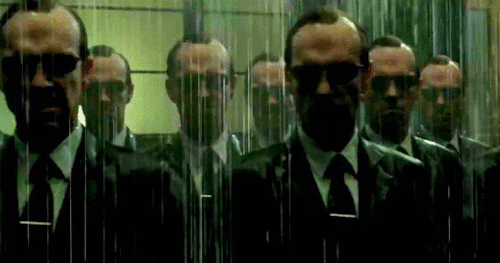
To do this, think about what makes a Corp and try to capture that in gameplay mechanics. Maybe the Corp units are ignored by Cops unless they directly harm the cops because they have legal immunity. Maybe they have better stats in general, because they have better gear than cops or gangsters. Whatever qualities they have, as Corporate representatives they should have commonalities that players should consider when engaging with them. When players start a fight with Corp enemies, they should have a good idea about what they should expect from Corp enemies.

A lot of work needs to go into differentiating the members of each faction - what is common to those enemies and how fighting them feels different from fighting enemies from other factions. Also, consider how the factions will interact with each other too - the way the factions behave and act will set the stage for how the game world works. The mechanics you create should, when the enemies engage with each other, play out in a way that makes sense within the world. Your game mechanics should help reinforce the narrative and the narrative should help reinforce the mechanics. This establishes a stronger, more cohesive world and experience to the player.
[Join us on Discord] and/or [Support us on Patreon]
Got a burning question you want answered?
Short questions: Ask a Game Dev on Twitter
Long questions: Ask a Game Dev on Tumblr
Frequent Questions: The FAQ
20 notes
·
View notes
Text
i really love disco elysium's total commitment to being from harry's pov. like yeah obviously you play as him, you change his skill points, you dress him up in little outfits, but the narrative does not make any concessions to the fact that you are very specifically harry du bois . turning the lights on in the very beginning will hurt, harry's extremely hungover. if you want to do something "cool," there's a high bar to clear, because do not forget you are a 43 year old depressed alcoholic cop. every other character's interaction with you is first and foremost informed by that information. you can change what direction he goes in politically but you cannot change his past mistakes, or his privileges, or the thoughts he has. you can pick what thoughts he says out loud, and even sometimes how harry feels about them being there, but they're all there. (by nature of rpg decision making, but every option feels informative on harry as a character in this game, even if you don't click to say it.)
one of my favorite little bits of this is the narrative explanation for the running mechanic. like ok, in video games, the player always is going to want a run option. unavoidable. how do they contend with that fact versus everything about their protagonist? he was formerly a gym teacher :3 . that reveal made me laugh and cheer like it's so small and i as a player was completely willing to suspend my disbelief and not even think about it but they are so thoroughly committed to the narrative. that was really exciting to me.
ALSO another favorite interaction that made me giggle and cheer with glee is the conversation(s) with egghead . like you Have to click every dialogue option to make it through that conversation. you have to repeat yourself and click every single option whether you want to say that or not. you have to be a cop with questions and sit and try to get through to a guy who's entire dialogue is essentially euro dance song lyrics and it's fantastic.
also also while you can choose which direction harry goes in politically you still cannot change who he is . like you can make him a communist but when you talk to other communists in the game they are very importantly reacting to a cop saying these things . and it's awkward, and it's clunky, bc he's 43. and a cop. and coming down from a bender.
there is so much care and intention laid into every aspect of the game i think it's so so smart and impactful
#it also resonated with me a lot for ocd reasons but that's another post i think#wretched text#disco elysium
16 notes
·
View notes
Note
I’ve been curious about your opinion on the Laudna book since it was announced earlier today on Twitter. Do you think the book will be good for filling the gaps that you’ve mentioned in Laudna’s development? Or do you think it’s sort of a cop-out/shortcut from actually establishing any of this at the table? (I’m leaning toward the latter but you have more actual ttrpg experience than I do and I might just be a little sour)
I alluded to this in my discussion of the book yesterday, notably in this post, but: it's not actually a shortcut. (I should also note: while some of my issues with Laudna do derive from the mechanics of D&D/actual play, they would persist if this were a written narrative, or one improvised without a TTRPG. My experience with D&D isn't really relevant here.) The fact that it hasn't been established at the table and it needs to be means that a lot of people are far less invested in Laudna as a character than they would be otherwise, and so the book is going to be a case of "why would I bother when this is my least favorite character specifically due to the lack of sense of backstory".
I also think that again, the issue is that Laudna's backstory does not feel lived-in, even if we don't know it. I've talked about this elsewhere as a negative space issue; I do not feel the weight of those 30 years, nor the closeness of those 2 years with Imogen, whereas, for example, we don't have a huge number of details from Imogen's backstory, actually, but Laura does successfully convey Imogen's mistrust of people and sense of loneliness (the notable exception again being those two years). You don't actually need to establish backstory details in-game in the sense that they don't need to be clearly outlined through RP in the present. You just need to make a character who actually feels like they've been through all the things your character sheet says they've been through, and that's really been the problem, and a book won't fix that and might make it worse.
22 notes
·
View notes
Text
Citizen Sleeper

What if Disco Elysium, but in space, and you're an escaped robot instead of a cop?
I just got finished binging through Citizen Sleeper again to play the free DLC stories, and wanted to recommend it here because I think it deserves more love. It's a narrative video game that I think would really appeal to a lot of you - Disco Elysium is a good touchstone, I think, in that it's very much about game mechanical interactions revealing the story, being a stranger in a fascinating and complicated place, questions of identity and belonging, and different forms of struggling communities trying to exist together.
More ramblings about why you should play this below
So first off, it's relatively short - six to eight hours, so it's easy to get the whole story. Mechanically, you're getting a number of dice each 'day' to put into activities, and getting a bit of story back with the results. One of the major themes of the narrative is chronic illness/disability; your robot body is slowly (intentionally) falling apart, and so not only do you have to get money to eat each day, but you have to constantly source the medicine you need to keep yourself together - if you don't, your condition degrades and you have fewer and fewer dice to work with. But this also eats into the time you have for understanding the space station you're on, and making the connections with other people that will get you better opportunities and support when you have a day where all your dice are low and nothing is going to go right. It's a frustrating spiral that will feel very realistic to anyone who's trying to live with a chronic condition. (Although, because it's a game, there's some good hidden tricks it uses to make it feel frustrating without actually locking you out of progress.)
The other characters that you meet in the world are good; there are some longer storylines where you get to know them over the course of events, but also some of my favorites are the ones you see only briefly, but repeatedly - the mushroom seller that kept me fed, the barkeep at the place that I could reliably pick up tips, the stray cat outside the apartment you gradually put together for yourself... you don't have a constant companion, and the game doesn't provide romantic opportunities (because you're a robot? because you're a stranger passing through? because there's only so much writing they could put in?) but there's still some good connections to be made, queer and disabled bodies are everywhere, and if I had one regret for the game, it's that there weren't more ways to spend time with people once their arc of the story had 'closed' but the game was moving on.
And then there's the story itself, about an exploited and abandoned space station, and the ways people try to survive - by exploiting others in turn, by trying to protect themselves and what they have, by escaping to new communities, or just trying to get through the day. It is very much a story that believes the only way we'll make it is by helping each other, but also it's realistic about the obstacles in the way of that. It's very good, and I love the way all the choices you have to make are reflected back by the characters around you.
Anyway yeah, go play Citizen Sleeper - there's a set of free story expansions that came out too, so if you went through when it originally came out, there's a bunch of new fun stuff for you to look for as well! (I do wish some of the systems made more of a reappearance, but also, game design is hard. :)
#Citizen Sleeper#games#recommendations#reviews#Disco Elysium#robots#bodies in scifi#disability#just good stuff
59 notes
·
View notes
Text
Mint Reviews: Eureka Investigative Urban Fantasy, by @anim-ttrpgs
The following is a review for Eureka: Investigative Urban Fantasy, a game currently in playtesting, set to be put up onto Kickstarter later this year. I received the playtest copy of the game in exchange for this review.

Eureka is a game about solving mysteries in an urban fantasy setting. It's meant to be dangerous and constantly keeping you guessing. The copy that I reviewed is a playtest copy, which is important to keep in mind for two reasons. One, because I was reviewing it before it's been subjected to proper layout, and addition of art. Two, because there may be changes to the game that alter the play experience that I would be expecting from this initial read-through. I certainly expect the authors to change or include new things before releasing the final version.
The mechanics of Eureka centre on rolling 2d6 and adding a modifier somewhere between -3 and +3. Your result will be one of three options: a Full Success, a Partial Success, or a Failure. Characters are made up of composite parts: you will have traits that give your character modifiers or special abilities, as well as two different health tracks, an Investigation Points Track, character morale/composure, and a list of gear.
Some of the central mechanics outside of the graded success of action roles involve Character Truths and the Investigation Track. Character Truths are personality quirks that tell you something core to your investigator, and reward role-play that is true to the character even if strategically it's a bad option.
As your characters look for clues, they will collect Investigation points every time they uncover a clue or fail a roll. Once they fill their Investigation track, they get something called a Eureka - a resource that gives the player the chance to tilt the narrative in their favour.
Damage in this game is layered: your characters have Superficial HP, and Penetrative HP. These tracks work interdependently of each-other, with Superficial HP bleeding into Penetrative HP if it fills up first. If you are familiar with the bashing damage and lethal damage of World of Darkness games, this system should be very familiar.
Stars:
The setting is very interesting and flexible, which means that if your group is very interested in urban fantasy, but you don't want to learn all of the big systems out there, Eureka is an option that only requires you to learn one system.
The game is designed to elevate suspense; the GM and the players are encouraged to keep secrets from each-other, and combat is often lethal.
The Woo Roll: a mechanic in gun combat that gives your characters some interesting moments when shooting a gun: after all, bullets don't just hit people, they also hit leaking pipes, fire extinguishers, innocent bystanders....
Wishes:
This game has a lot of rules (which is not necessarily a bad thing). There are three chapters dedicated to different kinds of combat and 2-3 chapters that need to be read to understand how characters work. As a result, however, I wish there was an index, to make finding pieces of information easier.
I wish there were more safety tools available in this game. I'm in the camp of preferring safety tools regardless of table or genre, but especially in horror games and games with suspense, there are elements of Eureka that could very easily trouble players who don't know what they've signed up for. The game encourages players to keep secrets from each-other, and prompts the GM to surprise the players with the kinds of horror that could be just around the corner. This isn't to say that a horror game shouldn't have some kind of surprise involved, but having a detailed Session 0 to talk about what is or is not on the table for everyone involved, as well as a method to signal that something in game is crossing Lines, would go so far here.
There are recommendations about what the characters should avoid playing (cops, FBI agents, etc.), but I found very little guidance about what kinds of characters should consider. I'd have loved to see some pre-generated suggestions for reasons as to why the characters are working together, especially because players are asked to create characters that want to work together, not characters that are ready to fight each-other given the opportunity.
Other Notes:
This is not Powered by the Apocalypse, and I think it's important to recognize that if you're thinking about buying Eureka. The rolls take inspiration from many PbtA games in that you roll 2d6 and get a staggered success, but the game is not designed for generative play. PbtA games ask you to play to find out what happens, but Eureka is designed to run pre-written modules, where the clues are thought of beforehand and the answers have already been determined. I read the dice rules and thought this game was PbtA, but once I saw the detail to which the authors explained how to use skills and handle combat, I felt like this game was actually closer to something like Chronicles of Darkness.
This game requires a lot of preparation, especially for the GM. If you are running this game, you will need to co-ordinate the character creation for each player separately, as the game recommends that the players not know what is going on inside other character sheets. It also requires you to convert the NPCs and villains from other adventures into Eureka's stats, because NPCs in this game roll just like PCs do.
This game lives on secrets. There are fantastical options in this game but the author recommends that the GM keeps much of the magical elements secret from the players. If there is a monstrous character, they are expected to keep that secret even from other players at the table - at least until a dramatically appropriate moment.
For me, I don't think I am the target audience for Eureka. There is a lot of guidance in this book for specific situations and expected problems at the table, which might be helpful for GMs that prefer planning to improv or for GMs that are unsure about how to adjudicate certain questions at the table. However, I feel like the 2d6 mechanic feels so close to PbtA for me that I think I would have a hard time separating my play patterns cultivated from PbtA play in order to run this game the way I would run a game like Chronicles of Darkness.
I understand why pvp conflict in a horror game might not be what the party wants, especially if the entire group needs to be on the same page to defeat a larger horror, but if the characters are discovering as they play that one of them is using very different talents and skills, the response to react with distrust or hostility is a very likely event - and the lack of moves to play through interesting character conflicts would make resolving those reactions very tricky for me.
Conclusion
If you are interested in games that encourage secret keeping and hidden agendas, and if you like games with a bit of crunch and freedom to character creation, Eureka might be worth checking out. If you prefer Powered-by-the-Apocalypse style games that focus on generative play, I recommend looking at something a little different.
42 notes
·
View notes
Note
i was wondering how do you handle wolf born garou cuz i have a character i was making being a sheriff who is wolf borne but wasn’t really sure how to handle say like age since he’s in his fifties but wolf only live at best 16 years was wondering your take on it
Hello again! ^^
I stole a lot of understandings of Lupus-born from old lore, W5 just profoundly has no depth either mechanically or narratively IMO, but here's where I ended up:
So in my current W5 game I'm assuming that when a Lupus changes they become a young adult, maybe late teenager, in equivalent biology, and then just age like a human from there – unless you wanted your Lupus to appear older or turn later in life, then I'd use the Crone's Curse flaw as inspiration there!
Beyond that there's no mechanical difference anymore in regards to stats or Gifts for Lupus-born vs Homid-born, it's all about characterisation. Your Sheriff here could be old enough now and integrated enough into human society that he's able to “act human” perfectly. You can also consider the fun things like 'how did this guy get a social security number so he could become a cop?'. Maybe another Garou forged documents, or helped him steal an identity. Maybe wherever he's a Sheriff is so backwoods they don't give a fuck.
Also are there any wolves by where this Sheriff is or did he move to a place no wolf has lived in decades/centuries now? Humans move for any reason but anytime a wolf shows up where it's not supposed to they're likely to get shot (and the dreadful sorrow I felt typing that is very good fuel for thinking about what it means to be a Lupus actually)
For psychology consider what's important to a wolf and use that as the starting personality influences, without making the Lupus unintelligent. Those things may have been replaced over the years, especially if this guy has been a Garou for like 30-ish years, so consider being a Lupus more of a very alien cultural background, rather than the Lupus's brain being inherently wired differently. The Lupus NPC in my game, Heart-of-Teeth, a Galestalker Galliard, is a 'weirdo' by human standards. She'd probably read as neurodivergent by a normal human, but I'd say her sapient mindset is focused through the lens of Tribal focus as that's the first framework as a sapient being a Lupus often gets. So she's a hunter, and a ranger. She's mission focused, and averse to luxuries and large settlements. Her relationship to the spiritual is much more pragmatic, but no less reverent. She also doesn't need to undergo any shift in religious perspective, she just understands the spirits are the way they are. And she takes the cooperative familial mindset of a wolf to a much bigger picture extent as she works with two frighteningly understaffed Septs – making the decision to roll without a Pack for the moment as she helps out the new Garou that are our PCs
But she loves her motorbike, and she's fundamentally not afraid of fighting and killing a guy – she was a wild animal after all, not a human raised in a controlled society.
I hope this helps!! I think having one Lupus NPC in a W5 game helps give it spice, more stuff for the PCs to bounce off of ^^
#I'm getting Heart-of-Teeth back onscreen the second my PCs leave NYC I swear to God I love her#wta#werewolf the apocalypse#w5#Lupus-born#SyntheticReplies
7 notes
·
View notes
Text
Vampire hdb
So there's two DE things I keep rotating in my mind and one of them is elaborations on What Makes The Pale Wax And Wane, because I think the game and the book give us some insight we can play with and I want to add what I think on top of it, in addition to the existing wonderful essay. This one deserves a proper writeup and I'm gleefully procrastinating.
THE OTHER ONE HOWEVER WHICH I CANNOT LEAVE UNSAID AT ALL is Vampire HDB.
To be fair it started with a more general "what if there's a vampire inner layer to the RCM not a lot of people - including within the RCM, including Harry - know about, but there's good reasons people are afraid of the cops and it's not just the usual". Harry finds out, chases increasingly offputting cases where a likely suspect is a well-placed officer, and so on.
But for the past week I've been thinking of a vampire hdb.
What I'm thinking is, this is something that happened around the same time as the bender. He wakes up with a classic transformation hangover. We don't even have to decide he's magically cured of brain damage and other pains - vampirism could preserve him as he is and only prevent further injury. Another option is that the curse will heal him in all ways, even neurological, but only eventually and with enough nutrition and adequate slumber and so on.
So this lead me to several fun thoughts about the game, as a vampire Harrier:
(By the way during the course of this I'm gonna refer to we and you kind of interchangeably. It just means you or I as players of the game. This is a side effect of rambling.)
We can run around in daytime as usual. Any discomfort we experience early on is attributed to the bender, so Harry doesn't think of it as very strange. Even after the reveal, the game doesn't actively stop us from going around in sunlight and only uses narrative means to dissuade us. I'm basing this on hdb being perfectly capable of running around after getting shot in the leg (and possibly the shoulder as well) - obviously there was a gameplay consideration here but hey, this is one too. There's 2-3 other points where the game encourages walking, but ZA/UM didn't feel like mechanically punishing us for running anyway and I don't feel like it either. I feel like some narrative punishments can include skill disadvantages, Kim uneasily suggesting you open an umbrella or wear shades (a classic for hangovers!), or just take it easy in general during the daytime. Also, maybe the night doesn't cap out 02:00 anymore, and the suggestions to pack it in for the night also come later than usual. Waking up is… maybe no longer at 0730? Volition will be disappointed. Then again the vow was to do so until you die, is it really truly relevant anymore?
Obviously this affects the investigation - who knows what you really are and archly hints at it? The Smoker? Evrart? Who dismisses the concept out of hand as fantasy? Joyce? Are the cryptozoologists actually extremely skeptic of the concept, and attribute it to Harry's generally confused demeanor? Is Pryce the one who turned you, hypnotizing you to forget it before sending you to Martinaise?
Are there other vampires, or different creatures of the night around Martinaise? Can we finally meet the Mysterious Eyes, when the night is darkest?
Can we finally eat the rich? Or at least say we want to, as good socialists should, and do we distress our environment with our violence a-la roughing up the lorry driver?
I also thought of a sliding scale between the desire for humanity and morals (not to be confused with moralism) vs the vampiric instinct. Obviously this is tracked in-game via a score called good vampire / bad vampire. To me this can affect the sensitivity to anti-vampiric implements - one of the approaches I like best is that the sun is harmful to vampires not because of UV, but because it's seen as a force of celestial good and illuminates the vampire's sins, of which they are so ashamed they experience physical pain. Having to be invited into places (another hilarious narrative option) also has to do with this - the vampire wants to make their victim bring disaster upon themselves with the invitation. I was thinking as you slide further into darkness, you must become less and less ashamed of what you are. With a person like hdb, where shame is already a massive issue, I can't help but wonder how this score can manifest, and how the skills will react with various scores and in different interactions. This of course brings me to -
Skills! Let's talk skills, I've been dying to talk about the skills all day.
Logic, Empathy and maybe Esprit De Corps - I want to say, these stay kind of normal to begin with, but they do suffer if you slide more and more into darkness.
Rhetoric, Visual Calculus, Authority, Suggestion - these always benefit from being a vampire (unless challenged with anti-vampiric implements, maybe)
Drama, Inland Empire - insanely high. Off their rocker. Drama quotes deliriously from works such as The Vampire Lestat, IE is conjuring entirely new concepts of what it means to live in the garden of savage beauty that is your mind.
All the motorics are higher. That one's a given.
Phys. Instrument, pain threshold, and endurance - also boosted, not much to say. Vampires are strong and fast and can tolerate much more than humans, when they aren't staked through the heart.
Finally, there are 4 more skills worth mentioning.
Half Light, for all intents and purposes, is your vampiric instinct to feed. The cornered beast. It hates what it's doing, but at the same time - what it wants is survival. It has to do it. When pressed by hunger or whatever else, it will push you to kill and eat.
Electrochem is also deeply vampiric. To the newly formed vampire, the world is beautiful. Scents are magnetic. The taste of fresh prey is almost carnal. It wants you to partake of everything. Permission is granted. God is in his heaven.
But there's two skills who aren't as supportive of bad vampire actions.
Volition is always Harry's moral support. Volition always wants Harry to do the right thing. The more Harry tiptoes into darkness, I want to say Volition grows wearier, and sadder, and Volition checks start getting worse and worse. If there's one skill that might convince us as players to steer clear of being a total monster, it will be Volition.
And there's Shivers.
I think the spirit of Revachol knows what you are.
I think the spirit of Revachol loves you, as it loves everyone in Revachol, but it also knows you are a blight upon it.
It will try and dissuade you. It will try to humanize whoever you stalk. It will remind you you have a part to play, much grander than this. But if you disregard it, it will have to find another champion. It will blow away, and for all intents and purposes, Harry can be abandoned entirely by it.
22 notes
·
View notes
Note
My favourite thing ever is the way Ashley gets Leon to smile. Honest to god, his most sincere and genuine smiles are the ones he's given Ashley.
Now if she could just get him to laugh, that would be something completely unprecedented.
Sorry, it just occurred to me literally today that Leon never laughs -- even one time -- at any point in this series. Other protagonists, at the very least, laugh at how stupid a villain's plan is sometimes. Not this guy. Not our Leon. He's too dead inside. Bro doesn't even laugh at OG Salazar, who may as well have circus music playing in the background any time he's on screen. We stan a depressed king.
I was actually thinking about this a little last night -- again, in the context of the whole "Ashley is Leon's anchor to reality/his road back to himself" thing that I've talked about before, while also paired with the shitpost-but-not I made the other day about Leon's sense of self-worth and identity.
Leon drifts further and further away from himself as the series goes on, and not only does he not smile anymore, he becomes downright sullen. There was a time -- a significant period of time, actually -- where you could have said that one of Leon's defining traits was his optimism. That stops being true by the time of Damnation; Leon's optimism is replaced by hollow machismo in a poor attempt at a coping mechanism in that movie -- and, by the time of Vendetta, even the machismo has fallen to the wayside. By the age of 37, Leon has completely and utterly embraced the creeping sense of despair that's been hounding his steps for years.
That has never been who he was. But it's who he is now.
And, as soon as I had that thought, something occurred to me that I somehow had not noticed in the 18 years since RE4 OG has been out:
Ashley is a foil for Ada.
That wasn't her intended purpose when she was created, but it's the narrative role that she's come to inhabit as the series has gone on and Leon's character has progressed without her.
In OG canon, Leon thinks of Ada as a part of himself that he can't let go. But the longer he clings to her, the less of himself he becomes.
And the last person to actually see him as his true self, lifted up from the despair, and without hiding (fully) behind a veneer of machismo was Ashley -- someone he did let go. Even in OG, he is very genuine and very sincere with his affection for her (platonic or not) in a way he really isn't with anyone after RE4.
So, when you point out that his smiles for her are genuine, there's really something to that. He trusts Ashley with a piece of his heart that he doesn't show to anyone else post-RE2. Like, literally, the last person who probably saw him like that was Sherry, and we already know that Leon estranges himself from her almost completely after they're taken into CIA custody following RE2.
And the Remakes make this way more obvious than the OG games did, too -- not only because of the RE engine being great for facial expressions, but because of the way the script changes make certain parts of Leon's character more noticeable. If you go straight from RE2make to RE4make, the entire opening sequence involving the cops and the hunting lodge is absolutely horrifying. If I was a new fan coming in from RE2make to RE4make, I would be knocked on my ass and going "This is not my Leon. This is not the sweet boy that I know. What the fuck happened to him?"
RE4make does such a good job with sharply juxtaposing who Leon was with who he is now. By the time of RE4make, Leon is so beaten down and tired and closed off and angry and, honestly, scared -- that he almost kind of feels like a completely different character. Except, he's not a different character. He's still Leon -- just, Leon with his blinders ripped off and his heart broken.
And, we know that he's still Leon, because every once in a while, the sweet boy that we know comes back. It's infrequent, and it's only for a few moments, but he's still in there. And it always -- every single time -- is only ever Ashley that pulls it out of him.
And Ada? She forces him to retreat again immediately, and he locks himself back up tight.
So, when Ashley gets permanently erased from Leon's life and Ada becomes more of a permanent fixture in it, that sweet boy from RE2 disappears, and he's replaced entirely by the version of Leon that's heartbroken and angry all the time -- because Ada is a constant reminder of all that he's lost, whereas Ashley, as his only true success story, was a hopeful reminder of all that he could potentially be.
I honestly don't think that Capcom even realizes that this is how they've written Leon's character. I don't think it was intentional for Leon's smile to fade with Ashley's absence in his life.
But that's just kind of how it happened.
#resident evil 4#leon kennedy#ashley graham#meta analysis#this one kind of hurt my heart ngl#i mean i love that leon suffers don't get me wrong#a happy character is a boring character#but goddamn man#can we give this guy a fucking break#can we get him some pussy that won't bum him the fuck out for once#will somebody please just be nice to him#and then fuck him so hard that he temporarily displaces from time and space#and when he snaps back into it he realizes how ridiculously hard he just came#and how stupid the look on his face probably was#and he just starts breathlessly laughing#CAN WE DO THIS FOR HIM PLEASE???#CAPCOM???#HELLO???
35 notes
·
View notes
Note
(sorry for long ask) I always felt that they could've used the civil war as an excuse for why there are a lot of bandits (but not in the way they do now - aka less guards/cops means more criminals). Have soldiers/deserters be a major raiding force, due to not getting paid, poor discipline or the nature of being an occupying force. There could still be other types, but it would break up the fur clad bandit monotany and get you invested in the war without doing the questline.
Also I feel like generic bandits are most often used when an area is cleared out of its more unique inhabitants (even bandits who at least talk or have a leader) but the game wants enemies in case you come back for another quest. Which I think speaks to a level/quest design issue but thats another topic. I feel like indtead of bandits, nature or undead enemies would make more sense. Or have it reinhabited by non hostile npcs.
As for yielding, its crazy how it only appliesnto yourself (with guards) and a few npcs, but its usually scripted so killing them is impossible (they become essential) or illegal (fistfights), otherwise its just a weird animation that happens.
I feel like they could have it at least where if most of bandit group is dead, those hurt can do the yield mechanic and then you sheathe your weapon, and they leave or give you something idk.
Those are great points! I think one big issue with bandits in Skyrim is, as other pointed out, they're randomly generated. If every band was generated for a determined "dungeon", with different motivations and different ways to deal with them that don't involve just killing everyone, it would make a lot more sense and be a lot more fun. In fact, you already see part of this. There are many bandit dungeons with their own special conversations and NPCs (there's one with a blind guy who's the anonymous leader father, and honestly you feel just so bad for him), so they could have tried, they COULD have made them unique. Personalized factions of enemies would bring so much life to the world. Disgraced bands of soldiers, mercenaries or adventurers (actually the source of much real life 'bandits'), petty thanes who steal from the poor, Khajiit caravans who faced discrimination and turned to crime, criminal families, pirates, there's lots you could do. That was sacrificed in the name of 'radiant quests' and it's something Bethesda has doubled down in their newer games.
I'm not saying that bandits should greet you with hugs and cuddles. I'm saying that, in an RPG, you should be given role-playing choices to deal with them in many ways. There is a lot in Skyrim about 'clever' heroes, but besides sneaking, there are little chances to use that cleverness. Meanwhile, have Fallout New Vegas. You can actually visit the bases of the 'bad' factions by many ways, even the Fiends which are the closest to generic post-apocalyptic bandits have leaders and you can talk to their leader, even if there's not much diplomacy to be done.
And the fact that yielding just straight up does not work is just terrible game design, it's an incomplete mechanic. It's crazy that it just happens and then they just get up and keep hitting you??? I wouldn't mind a 'knocked out' mechanic, which many simpler games seem to have. I wonder if it was something that was just ommitted or did poorly in playtesting. The unfortunate fact is that many gamers are very bloodthirsty and do attack fleeing or surrendering enemies. Being a strict roleplayer I don't enjoy that. I personally don't do many pacifist runs, but I want the things that I do make sense, I don't find any enjoyment in mowing down bandits dressed in fur and endless wolves. I'd much rather have strong or complicated fights tied to narrative.
(there are mods that fix the yielding 'mechanic' and add depth to virtually all of these aspects, but they're mods, so they aren't in the base game, and they work so-so)
10 notes
·
View notes
Text
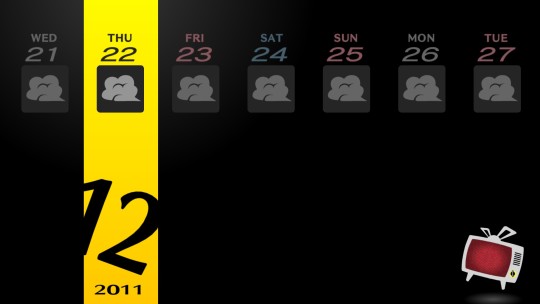
DAWN OF THE FINAL DAY, TIME TO BEAT SOME ASS
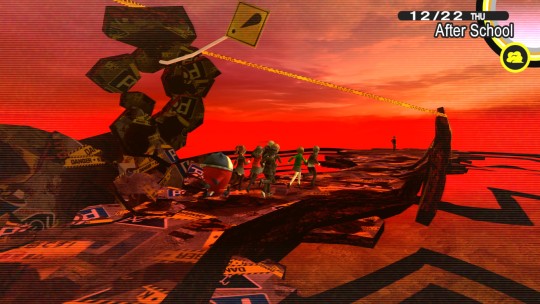
Magatsu Inaba is by far the best dungeon. The best ambient music for sure, and also just annoying in interesting ways. Adachi has a lot more control over the place than previous folks did, which leads up nicely to the revelation about him that we all saw coming.
There's a point where he's like "let's play a game! get thru this level without getting in any fights!" and it was so fucking irritating, i got booted out of his world twice trying, and like... that's a fun trick, to have the mechanics of a place be more hostile so you dislike Adachi even more. Also, the level where you have to follow the spiral all the way to the middle, passing or fighting about 8 shadows? goddamn fucking bullshit. I hate Adachi, he's amazing.
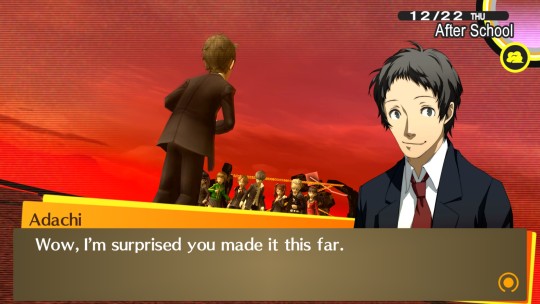
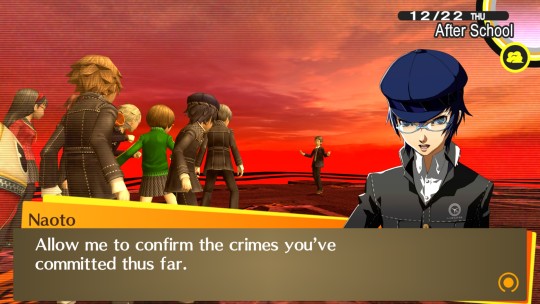
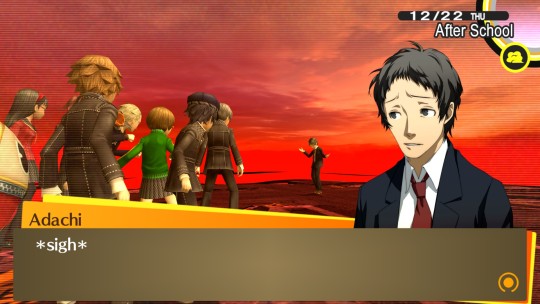
WHEN I TELL YOU I LAUGHED OUT LOUD
OH GOD I FIGURED IT OUT he's like dime store Handsome Jack. he doesn't nearly have the swagger, but because that swag is not so Off The Chart Bonkers like Handsome Jack, he seems like less of a poser than Jack? So it actually works really well. Adachi is just enough of a total bitch that he can still back it up. He's a delightful villain!
Like literally if you removed the tacked-on stupid sexism (WHICH WEIRDLY? THEY DO? IT DOESN'T COME UP AGAIN REALLY AFTER HIS INITIAL REVEAL) he's a top five villain. Huge fan of this odious little bastardman.
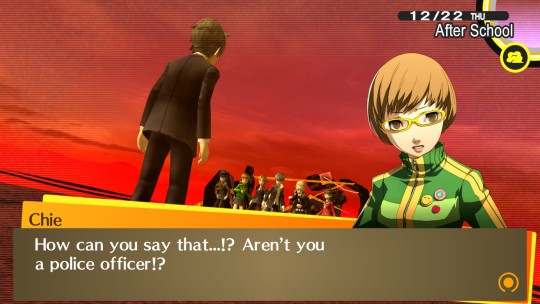
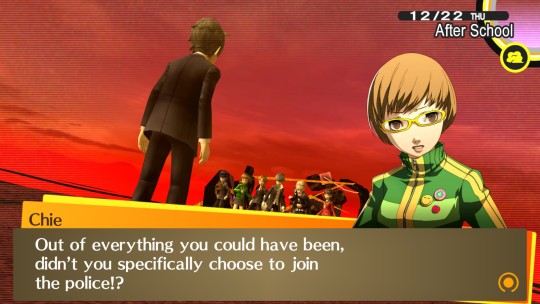
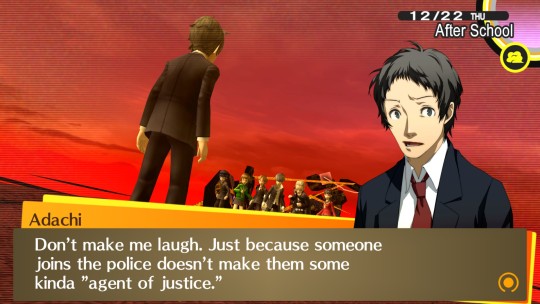
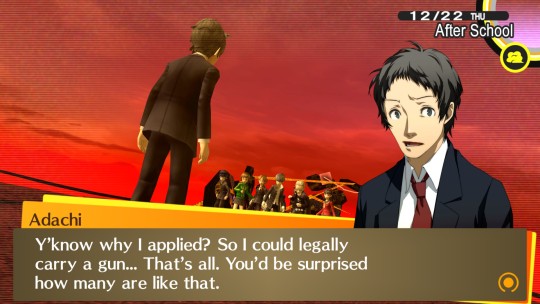
B R U H

Adachi, I love you, you're such a shit
Which, I am cackling, but narratively, he works phenomenally well for his position in opposition to the seekers of truth. Oh yeah sure he's the killer, but also he is going to drop some hard fucking realities on your plate while he's at it. Yeah, many cops are bullies who go into the force to get access to power. Yeah, the public will be angry at the revelation that Namatame isn't the killer. People want specific truths to become reality, and that is what has fueled the Midnight Channel all this time.
HE'S GREAT. TEN OUTTA TEN. Well, nine. The weird "bitches and whores" thing was so odd, glad they left it behind now.
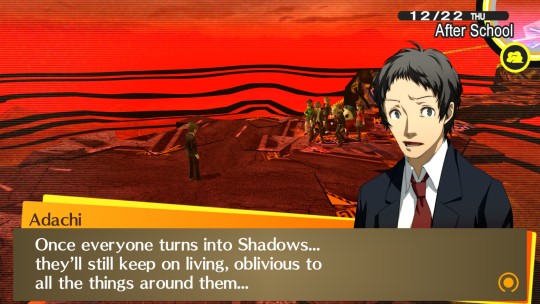
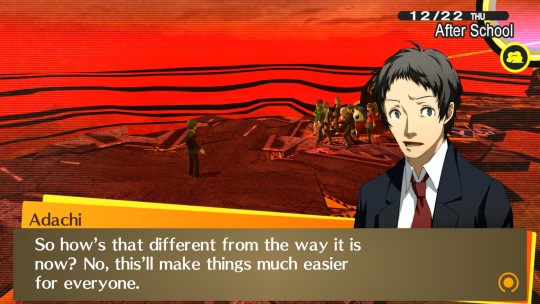
As far as dumbass Assimilation Plots go, this one is better than most.
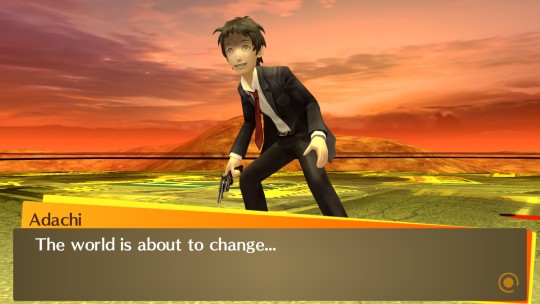
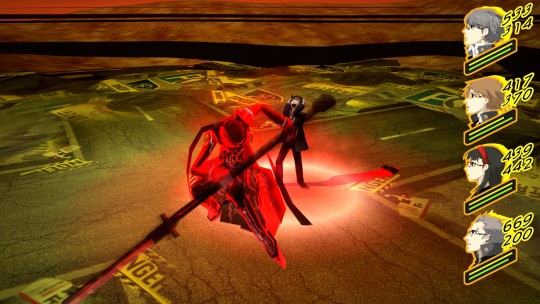
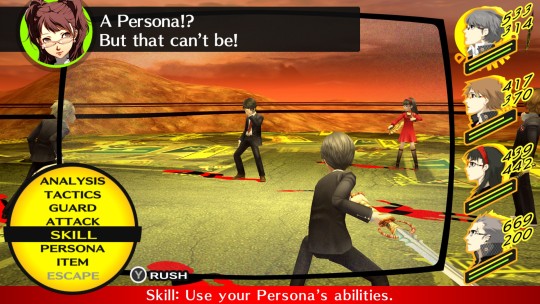
Okay so I seriously way overleveled for this game's difficulty, but even so I love the Adachi fight. After seeing everyone's Shadows as these huge weird unleashed id-creatures, going into combat against just a guy, that was really way more effective and menacing. Also his idle animations are great. Adachi will stare at whoever is up next and every few seconds he just has a hysterical laughing fit behind his hand. It's AMAZING, he's so creepy and cracked.
Also as I expected, this bitch got a Persona. Which makes sense! He has faced his inner self and his reward is a Persona, which seems to be the Magatsu Izanagi that was hinted at in his maxed-out SLink I glimpsed in the other ending.
So not only does he have Reverie's power, not old is he a Wild Card, he also has the same persona but Disaster-flavored.
Sadly he's really not a difficult fight. I would have killed to have an Adachi with multiple persona, but that would necessitate questions about him and the Velvet Room, blah blah.
ANYWAY HE'S GREAT.
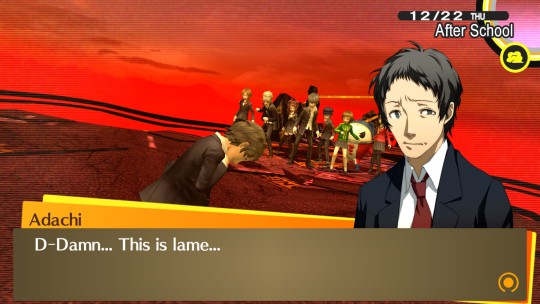
pats Adachi on the head as condescendingly as i possibly can
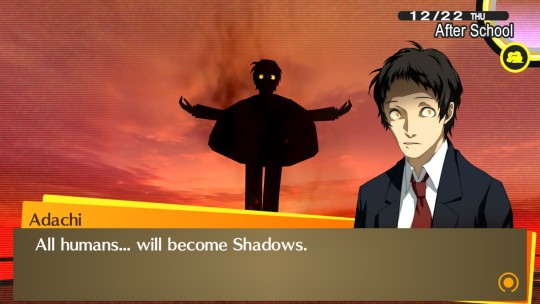
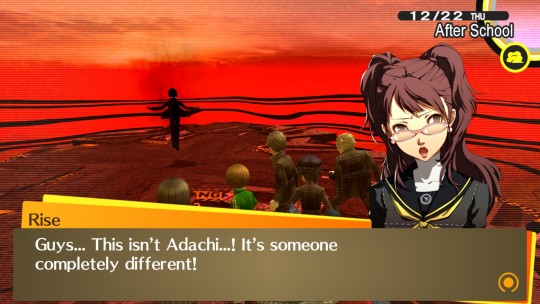
OH BUT LEST YOU WORRY THAT YOU'D GET THROUGH A PERSONA GAME WITHOUT A BIG NIGHTMARE EYEBALL BOSS, WE AIN'T DONE YET
21 notes
·
View notes
Note
Heya! Just wanna say I can't wait for more about your au and also what is your favourite L. Game from concept art to design?
Hi! <3
L Game? as in Little Nightmares?
I'll go least fav to fav
3. Very Little Nightmares. Tiny mobile app screen where you tap to control. The screen cannot recognize my meaty fingers's input!!!!! UGH I'm just annoyed with the controls. The story was fine I suppose but felt like it lacked something. Lacked some oomph. Lacked true moments of horror. Not made by the original developers. Was the first LN game to introduce the fact that there are other children out there with scary supernatural powers. This LN game was a side story for the explanation behind the hanging man from LN 1. (At least... kind of.... the hanging man is a weird situation thanks to the comics...) It's an odd Six cop-out. We're led to believe this character we are playing is Six, only to reveal at the end she's a whole different character and then just... immediately killing her off. We can't even figure out who she is as a person. We don't really have any interactions with other characters enough to solidify her personality.
I did adore the hidden easter eggs in the game. Nome with a bow was cute. I was curious about the other enemies and their circumstances, like why the butler is handcuffed. Where the girl's mother was. How so many kids end up at the Nest. Really only lead to more questions than answers.
2. LN1 is really good. Heavy Ghibli inspiration. A great introduction to a dark world, a unique dollhouse camera angle perspective style. A slight rocking to the screen to indicate you're on a boat. The amazing lighting. The finale; Six walking off sucking out souls of the guests that chased her to eat her, when she's now eating them. Perfect revenge power trip. Knowing she no longer has to physically consume things anymore. The nome she killed, but all the nomes she hugged still coming over to watch her leave (?) great scenes...
The DLC introduced tough water mechanics that glitched out the physics engine but still were interesting enough for the DLC character. Showcasing a true addition to the Maw to peak the interest of viewers. The horrific and terribly sad ending and plot twist that took everyone by shock. Despite its glitches and perspective-deaths, its still overall a solid game.
1. LN2. I'll admit LN 1 is more put together than the second game. The sequel (or prequel rather) seemed messy in development, like they weren't sure where to really go with it. They had a lot of rough concepts and a lot of it seemed to get scrapped mid-production. Seems like they even intended for heavy DLC exploration with other children too. With how it turned out, its a pretty decent game. But knowing the scrapped DLC content and alt. directions the story was gonna take, it feels like a bit of a confused narrative. We got confirmation that the children really do turn into grotesque adults. That there are other children with creepy powers. We know of Shadow Six's origins. We know why people flee to the Maw or other places away from the mainland. The concepts are frankly more fascinating than the finished story, (children plugged into tvs, Mono feeding Six or Six feeding Mono, giant ???? meat baby???? you can't top THAT) tho the finished story is probably cleaner than the latter. Six dropping Mono at the end was so shocking to everyone and after thinking hard about it, I can't find any real logistical or emotional reason for her to do so. I think it was just genuinely a forced in betrayal for shock value. And hey, it certainly was shock value. Despite this game ending in completion, or really, a loop... and despite it being a PREQUEL... I can't help but feel like this game ends on a cliffhanger to me. Like there's more to the story. There's stuff untold about this universe.
So LN 2 and LN1 are really close in favoritism. LN2 had the most fascinating concept art ...without Ghibli Bath Houses to take inspiration from like in LN1, so they really took it in risky directions. But I still acknowledge LN1 is more solid of the two.
I think I just enjoy the LN2 mechanics a bit more. I like working together with Six, though frankly I was really disappointed learning that LN2 was in fact, not a multiplayer game. That Six gets separated from Mono several times throughout.
I have plenty more to say about these games but this is probably the simplest assessment to give right now!
12 notes
·
View notes
Text
I just completed The Talos Principle 2 100%, so it's time for an unsolicited review of the game. Bottom line(s) up front: I enjoyed this game and some of the narrative features that could be seen as "flaws" really helped characterize the world. There are a few things that I would nitpick though, given that it's a more character-driven game than its predecessor yet there are inconsistencies and a lot of moments that made me roll my eyes or dislike a character outside of the game's intentions.
More thoughts under the cut.

Starting with the good stuff:
The puzzles were far more streamlined than Talos 1, and while the difficulty was lowered, the learning curve was far smoother. Talos 1 started with very basic puzzles and then very quickly ramped up the difficulty and stayed like that for the rest of the game. Talos 2's puzzle progression was wonderfully linear (except for a few puzzles here and there which would be stupidly easy), with the first area having simple puzzles that can be solved in under 30 seconds, to the golden puzzles being the hardest in the game. I never used the flame mechanic (though heavily considered for one of the gold puzzles, Thrust Vector, which I had to redo three times because I couldn't run fast enough), but I think it is a good addition. It takes away some of the frustration for people who might be able to solve all the puzzles but are particularly struggling with just a few.
The plot line felt complete and complex, with meaningful endings. I read another review here that mentioned that the dialogue fell flat as if the authors were trying to tell you their viewpoints rather than letting you figure out your own, as there weren't dialogue options to argue against ideologies. While I am a radical humanist, and enjoy a lot of Jonas Kyratzes' work, there were still some viewpoints (Miranda's in particular, which I found extremely childish and benign) I disagreed with. Unlike the first game, where you could argue and present evidence for and against claims with Milton, this game only lets you agree or disengage. It might come off as ostensibly lazy writing, but the fact that you can't argue with some of the characters helps characterize the functions of this new society. There is a terminal you can access in the interactive fiction exhibit called "Argument Simulator" that explains this exact thing. The simulator is an endless loop of "you're wrong because x" and the only way to escape is by selecting "let's find something we can agree on". The citizens of New Jerusalem have founded their society on the tenants of respect. Even characters with different views like Byron and Al are close friends because disagreement is not arguing against an idea, but choosing not to further it. I do wish there were more dialogue options for exploring character's viewpoints though (especially Yaqut, whose character I didn't fully understand except as someone confused about different ideologies and in staunch agreement with Miranda).
The small things in this game really made it stand out. The cat photos in Milton's rest, the text adventures in the Interactive Fiction exhibit, and especially the somnodrome plot line. The concept of the robots not being able to access their source code and creating a machine to circumvent said blackbox makes for a good side quest, even if it has little impact on the main story. Tom Jubert wrote the dialogue for Milton in the first game, and seeing a similar dialogue style in your chat with MILTOHIM was a cool throwback to the first game.
Now for the things I didn't enjoy:
The Theory of Everything plot point had no foreshadowing or lead-in, making it very difficult to conflate three-fourths of the way through the game. Let me clarify that I don't mean that it felt like a cop-out or retconned, just poorly introduced. In the lost labs, you can view updates on the experiment, but these are useless since they don't explain anything. Just "lack of power" or "unstable infrastructure". There isn't anything substantial that clues the player into the fact that what Athena is trying to solve is basically the universal equation. So when the game reveals The Theory of Everything, the player has to suspend a lot of disbelief. Furthermore, none of the other characters seem shocked enough by this, and you cannot engage them in conversation beyond their initial thoughts. Putting in a few extra files that show some preliminary research or philosophical texts on the "theory of everything" would have helped relieve this issue.
The maps. Holy fucking shit why were they so large. I can understand that the developers wanted to create vivid landscapes and give the game an open-world feel, but there was just way too much running around. It quickly became annoying. The Prometheus stars (and really all the stars, to be honest) were more exhausting and tedious than challenging. At least this is consistent with the insanity of stars in Talos 1, where some of the stars were nearly impossible unless employing sheer luck or trial and error.
The whole Athena, Miranda, and Cornelius storyline was just weird. I mean, Athena gets tired of people treating her like a prophet and the citizen's self-hatred, so instead of dealing with it naturally or listening to Byron (who warns her of the citizens' nihilism in a memory), she runs away to start a nuclear family? She then has a daughter (which I will discuss later in my confusion about why the robots have gender, or at least conform to some aspects of it without any explanation.) who Cornelius and her infantilize (even though we know that the concept of "children '' doesn't exist in New Jerusalem, as per a conversation with Yaqut, which makes sense given you are born with the same capacities as everyone else). She then acts surprised when the person she treated like her child, acts childish and blows herself up. This is never elaborated on, instead, Cornelius theorizes that Miranda thought herself above death as she perceived some special purpose in her design, likely a symptom of not being raised in society. Again, this might be nitpicky, but I was weirded out by the whole thing.
This segues into my next nitpicky point: the robots are somewhat gendered, and it's never shown how or why? I get it, you're going, "Oh boy, another trans person is complaining about an innocuous detail in a game because it didn't match their viewpoint", but it's just strange that the game goes into detail about menial things like Atal and his cat, or the dome, or even Helga's whole shop for which she re-invented the concept of money, but doesn't explain this one reoccurring detail? We know that the robots can choose their name (shown when Byron explains that he named himself after Robert Byron, not Lord Byron), and their voice pack (shown when Ovis mentions that they can switch to Alexanda's voice and say whatever), but not this? Most likely their pronouns just come with their voice pack, and can be changed at will, but it would be cool to have some confirmation or discussion. The player character is also referred to as he/him and with the name 1k throughout the game, and you never get a chance to ask why. I know, I know, this is not a very salient point of dislike. It's just odd that the game discusses so many aspects of what makes society, but doesn't explain an extremely benign factor that heavily dichotomized the preceding society. But whatever, this didn't hinder my enjoyment of the game.
Overall, Talos 2 was an amazing game and a worthy sequel to the first game. It has its shortcomings, but I was blown away by the game's ingenuity, both from a writing and design perspective. If anyone else has any other insights or opinions on the gameplay and storyline, I would love to hear them. Great game, 9.8/10.
4 notes
·
View notes
Text
if people like the idea of ttrpgs but feel intimidated by the whole setup, then i must wholeheartedly recommend the arhkam horror card game
(arkham as in lovecraftian horror, not batman related despite my recent kick)
characters are assembled as a deck of cards from a pool of abilities, assets, and events, so your deck is thematically who you are as a person + every character you pick from their huge cast has their unique abilities, stats and weaknesses,
and they have pretty good prebuilt decks
so that's character creation done
no dm needed bc the story and encounters are also driven by story-specific decks of cards and instructions
and you don't need to worry about "am i funny or a good storyteller" bc it'll come naturally via playing the game and trying to use your cards to solve problems. you'll play a cool combo mechanically and then you pause and think about what actually just happened and it's batshit crazy
example: i have an ability that lets me tag along w any teammate should they move from my location to somewhere connecting once per turn
my friend needed to take a shortcut that required a dexterity check, and we all gave him boosts to pass this check for less than 50% chance of success. we'd run out of time versus the big bad if he didn't succeed
he passes, he takes the shortcut, i tag along
what actually happened is: my friend is playing as this old decrepit professor with arthritis. his shortcut was (via game mechanics) leaping from the roof of our hotel into another room. we all did the equivalent of "you got this old man 👍👍 now jump" bc he wouldn't have passed without us committing boosts to his skills at the cost of our own resources
old man makes it, but what does that mean for me, the spry young boxer who is overprotective of his friends?
we decided that the two of us trapeze-style flung ourselves off the roof, the boxer clinging to the old man's ankles, and we made it into the room through an open window
or, our other friend accidentally made everything worse bc he decided to beat every skill test the game presented him and then chose to "tell the truth" in the story crossroads
what that amounted to, if you read the flavor text, is: he was found at the scene of a grisly murder, knife in hand and no memories -> he called his friends (us, the other players) in order to help (thus the game is set up) -> passed all the skill tests needed so we had time to investigate before the cops arrested us (aka cleaned up the crime scene) -> unluckily drew out a weakness card that was him wandering this hotel with blood all over him so it's an extreme penalty to negotiate with npcs -> but he's the only one available in that area to divert nosy hotel guests so it's just him using his stubbornness (willpower skill) to gaslight these guests into "nothing to see here 🥰" and somehow succeeding -> cops find him but he's fucked up at every turn by successfully hiding the evidence and presenting his own investigation notes too quickly (oh, i also killed an innocent man for him 😔) and it was so batshit insane they went after him which is why we had to go to the other rooms via rooftop instead of the halls
or the mechanic of us playing cards as assets to boost our stats -> we all played ally cards -> narratively amounts to
original friend wakes up at crime scene, panics and calls his other friends -> we arrive and call our friends -> 7+ people are now accessories to crime, and we as a group get to decide on the fly why the hell are we all friends and instantly down for murder and its fallout
there was another game where me and a friend kept getting fucked over by the location placements of the game, and constantly missed each other when we were trying to end up in the same location
narratively decided we kept mistiming our gondola rides in venice and were wistfully reaching out to each other across different canals
or, at the end when venice flooded, i had the comedic timing of drawing out my weakness: a stubborn detective enemy that thinks i'm the cultist
so he's climbing out of the flooding canals and onto our one surviving gondola that already has five people on it, absolutely soaking, and "👉 You."
the rest of the party gesticulating behind the detective "BRO." at the eldritch horror rising out from the sea
anyways, it's fun and prob the lowest commitment one can invest in a ttrpg
#redglyphs#verm is playing...#also the game writers took what could have been a nasty inheritance and fleshed it out. did it right
6 notes
·
View notes